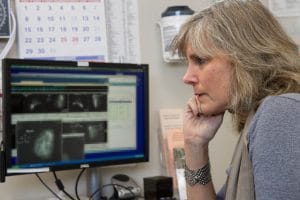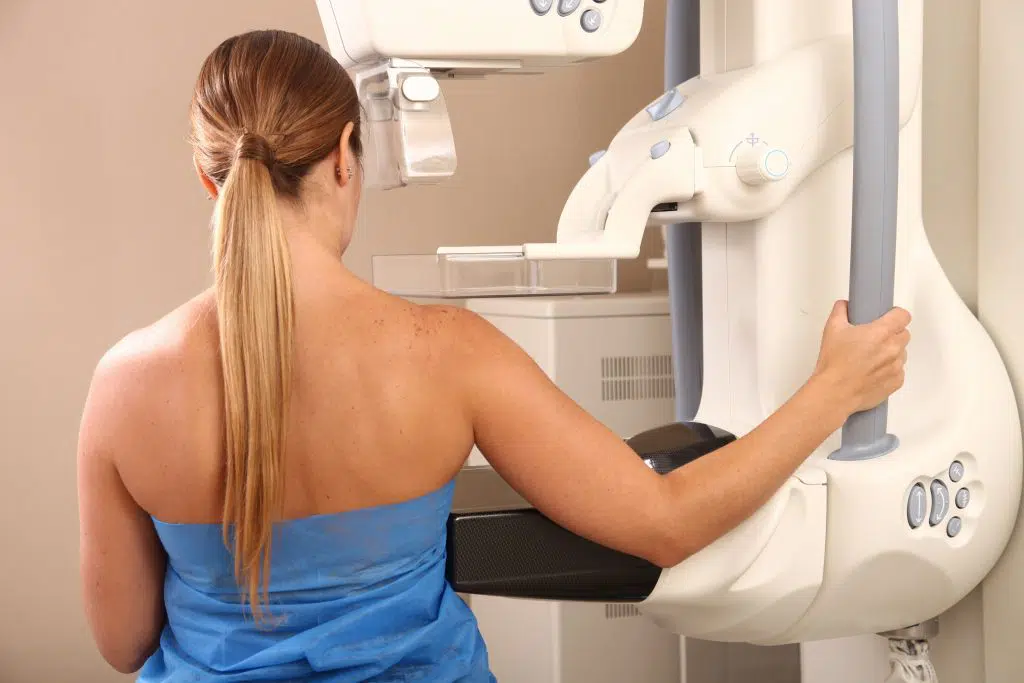by Laura Esserman, MD
Breast cancer screening today:
A groundbreaking breast cancer screening study is underway in California and you may be eligible to be a part of it. It’s called the Wisdom Study. The aim is to determine if we can make screening better by personalizing each woman’s mammogram schedule, compared to the current one-size-fits-all, annual approach.
In the United States, most women start screening for breast cancer at age 40. This has been the standard for the past thirty years and is the guideline recommended by some professional organizations. But within the medical community, there is disagreement on whether this is the best approach. This has led to competing and conflicting guidelines. Women receive different screening recommendations depending on what clinician or specialist they visit. This has left many women confused about what age to start screening, how frequently to screen, and until what age.
One of the problems is, like any medical procedure, there can be unintended consequences from mammographic screening. Mammograms have a high false positive rate that can lead to unnecessary stress and negative breast biopsies. The more often you are screened, the more likely it is that you will have received a false positive. Negative experiences like this lead some women to choose to forego screening altogether.
Today, with advances in our understanding of breast cancer and genetic testing, we know much more about women’s individual risk of developing breast cancer. And better estimates of a woman’s personal risk provides us with an opportunity to see if we can do better, and improve detection rates while reducing the number of unnecessary breast biopsies.
WISDOM Study
 The WISDOM Study (Women Informed to Screen Depending On Measures of risk) is being spearheaded by University of California as part of the statewide Athena Breast Health Network. Physicians and scientists at Sanford Health in the Midwest also enthusiastically support Athena and were integral in designing WISDOM and expanding the study beyond California.
The WISDOM Study (Women Informed to Screen Depending On Measures of risk) is being spearheaded by University of California as part of the statewide Athena Breast Health Network. Physicians and scientists at Sanford Health in the Midwest also enthusiastically support Athena and were integral in designing WISDOM and expanding the study beyond California.
WISDOM is designed to test an approach that uses our understanding of personal breast cancer risk to try to optimize screening. This approach personalizes screening recommendations depending on a woman’s personal risk assessment: women at high risk are screened more frequently and beginning at a younger age, while women at low risk start later and are screened less frequently. The 5-year, 100,000 woman study will determine whether this approach works better than annual screening. This study is open for recruitment to eligible women in California and to eligible women who receive care with Sanford Health.
WISDOM uses a comprehensive risk assessment based on the widely accepted Breast Cancer Surveillance Consortium (BCSC) model, which factors in endocrine exposures, family history and breast density. WISDOM’s risk model combines BCSC with genomic risk factors, including a 9-gene panel (BRCA1, BRCA2, ATM, CDH1, CHEK2, PALB2, PTEN, STK11 and TP53), and recently validated single nucleotide polymorphisms (SNPs).
Why WISDOM is important
When you think about how much technology and medicine has changed in the past 30 years, it is shocking to think breast cancer screening recommendations have not changed at all. Even more shocking is that almost 600,000 women each year in the United States go through the stress and anxiety of a false positive mammogram. Women deserve better. WISDOM, a study designed with the help of breast cancer patient advocates from around the country, is trying to do just that.
As the first large-scale study of a new approach to screening in over two decades, WISDOM is poised to make a difference. If it is successful with its risk-based screening approach, it could fundamentally change how screening is done in the United States. Its goals, to reduce the number of false positives while maintaining or even improving our ability to detect cancers in their early stages, would also change the lives of women everywhere.
But we cannot do it alone. We need your help.
Participating in WISDOM
If you are a woman aged 40-74, with no history of breast cancer or DCIS, and receive health care in California or at Sanford Health in the Midwest, you may be eligible to participate in the study. Simply visit www.wisdomstudy.org to learn more about being a WISDOM volunteer and if you choose, sign up as a volunteer, and join our effort to find a better way to screen for breast cancer.
How FORCE supports Wisdom
FORCE volunteer Joanne Kreindel, a former Peer Support Group Leader and current Community Liaison for the Los Angeles area, has been involved in the Wisdom Study since its inception. She is a member of the Advocate Committee, seeking to ensure that potential Wisdom participants’ issues and concerns are addressed.
We’re looking to the women of FORCE to help us raise awareness of the study and encourage participation. To make this study a success and to achieve meaningful results, we need 100,000 women to participate! Please participate if you are eligible, and encourage your friends and family to do the same. If you are not eligible, you can still help us achieve our goals by spreading the word and helping us reach our 100,000 target. We will also need FORCE to help us disseminate the results when the study is over and the results are published.

Dr. Laura Esserman is a breast cancer researcher passionate about ending the controversy in breast cancer screening. She is the lead researcher for the Wisdom Study and also serves as professor of surgery and director of the Carol Franc Buck Breast Care Center at the UCSF Helen Diller Family Comprehensive Cancer Center.
